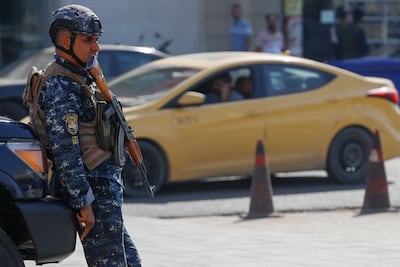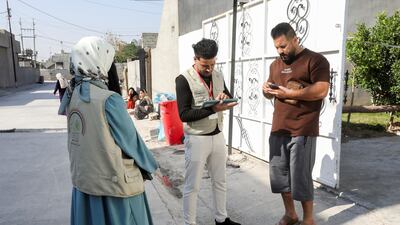Iraq began its first national census in nearly four decades on Wednesday, an important step towards collecting critical data on the population and addressing the country’s development challenges.
Prime Minister Mohammed Shia Al Sudani called on Iraqis to “co-operate with the mobile enumerators teams and to give them accurate and truthful information”, and stressed the “importance of the resulting database and its critical role in development plans and improving services”.
Iraqi security forces have been deployed on the streets and have been running checkpoints nationwide since midnight, after authorities declared a two-day curfew to enable the count, transforming Iraq’s bustling cities into quiet zones.
Large teams of census takers, wearing beige vests and using tablets, have been going door-to-door to collect information from residents, marking off each house visited on neighbourhood maps.
It is Iraq’s first comprehensive population count since 1987 and its first fully digital census. It aims to gather crucial demographic data to guide economic planning, resource allocation and government reforms.
Iraq has carried out several censuses since the first in 1920, which was conducted by British authorities. After the fourth one in 1947, the Iraqi monarchy established a law mandating a census every 10 years.

The census form includes 70 questions, starting with basic information about family members and moving on to topics including health, education, employment, economic status and disabilities, Planning Minister Mohammed Ali Tamim said this week. Families would not be asked about their ethnicity or sect but only religion, he added.
Questions on sect and ethnicity had been a major obstacle to conducting a census since 2003, before political parties agreed to exclude them.
An element of that agreement was with the Kurds, who have been at loggerheads with Arabs and other minorities over disputed lands stretching from the Syrian border to Iran that they claim as part of their autonomous region, including the northern city of Kirkuk, a major oil hub.
Despite the census form excluding questions on ethnicity, and the political agreement that the results will not be considered for any plans to define the final boundaries of the territory to be administered by the KRG, Kurdish political parties in Kurdistan are urging Kurdish families to register in Kirkuk.
Arab and Turkmen politicians have said there was a significant influx of Kurdish families into Kirkuk to be registered in the census.
Arshad Al Salihi, head of the Iraqi Turkmen Front, alleged that a 100-square-metre house in northern Kirkuk was empty two months ago but 20 families were now registered at that address.
"In our meeting with the Prime Minister, which was also attended by brothers from [Iraq’s semi-autonomous Kurdish region, we agreed that this census will not be a guarantee to implement Article 140," Mr Al Salihi said in a video, referring to the article in the constitution to address the issue seen in Kirkuk.
"To the Kurdish parties I say: Be aware that the project of annexing Kirkuk to the region is gone, stop thinking about it and let Kirkuk residents live peacefully in a secure and stable area, you've tried everything and realised nothing," he said.
He called the Kurdish move a "provocation" and said the "information of these families will be cross-checked with the records".
Kurdish politician Ala Talabani said Mr Al Salihi's statements were "unjustified". She added that the families referred to, "including my family and I, are registered in Kirkuk from our fathers and grandfathers, and were displaced during the time of the former regime as part of Saddam's chauvinistic policies".
For millions of internally displaced people, many of whom fled their homes during the war against the terrorist group ISIS and subsequent conflicts, the census will record their previous and current residences. It aims to address their needs while integrating them into national planning.
The initial results will be announced within 24 hours, while the final figures will be made available up to three months later.
The eighth census, in 1987, was the last one to cover the whole country. The most recent one, in 1997, did not include the northern semi-autonomous Kurdish region, which then had acquired international protection after the Iraqi army was driven out of Kuwait in the 1991 Gulf War.
There were attempts to conduct a census following the 2003 US-led invasion that toppled Saddam Hussein, but political infighting over several issues, most notably tension over disputed territories, as well as security concerns, lack of funds and the Covid pandemic, led to it being put off several times.
During the hiatus, the Central Organisation for Statistics and Information Technology – the Iraqi government's statistics agency – has been producing estimates. According to their figures, the population stands at about 43 million, based mainly on an annual birth rate of between 850,000 and one million.


